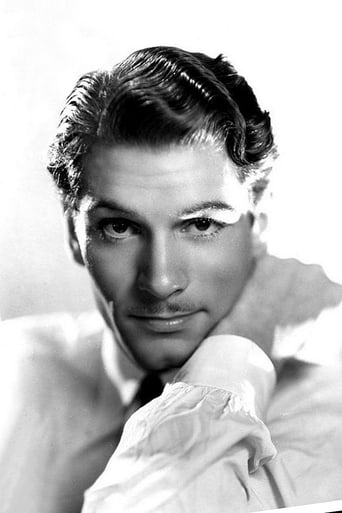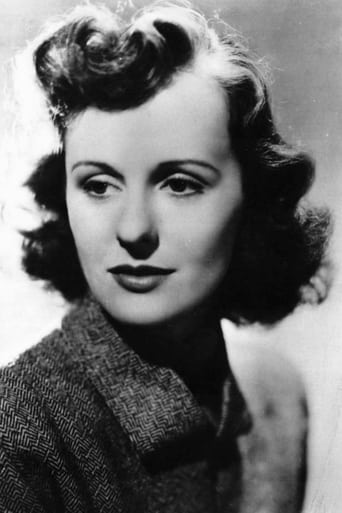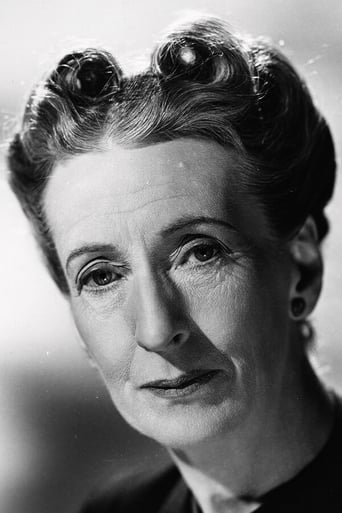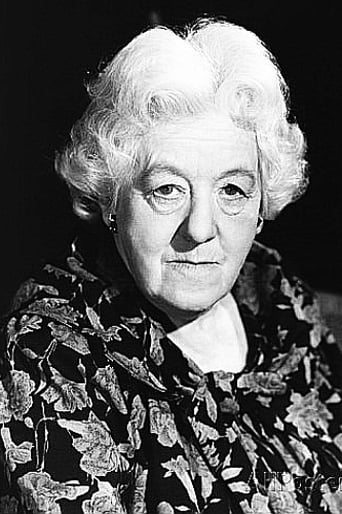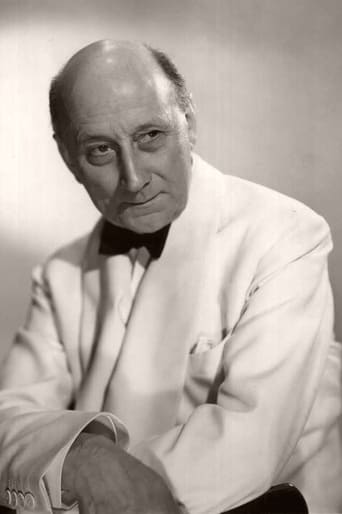FeistyUpper
If you don't like this, we can't be friends.
Quiet Muffin
This movie tries so hard to be funny, yet it falls flat every time. Just another example of recycled ideas repackaged with women in an attempt to appeal to a certain audience.
Marva
It is an exhilarating, distressing, funny and profound film, with one of the more memorable film scores in years,
Fleur
Actress is magnificent and exudes a hypnotic screen presence in this affecting drama.
GusF
A satire of the English way of life in the first half of the 20th Century from the perspective of a Soviet engineer, this is a very enjoyable romantic comedy film. However, I have to admit that I enjoyed the light comedy of the first half of the film more than the rather openly propagandistic second half concerning the Second World War. I don't think that the two halves are married together as well as they could be. Given the time that the film was made, the use of propaganda is not surprising, let alone objectionable, but I preferred two other Laurence Olivier films which took a comparatively more subtle approach on that score: "That Hamilton Woman" and "Henry V" (1944). The film is well directed by Anthony Asquith and well written, particularly in the first hour, by the Russian-born Anatole de Grunwald, who likely used his own early experiences of English life as inspiration for some of the material. The film stars my absolute favourite actor Laurence Olivier in a wonderful performance as Ivan Dimitrevitch Kouznetsoff from Ninji-Petrovsk - how do you do? Very well, thank you. His Russian accent is excellent and he does a great job in the early parts of conveying Ivan's struggles with the English language. Olivier had a flair for accents but he had a tendency of going a bit over the top when he used them in later films such as "The Boys from Brazil" and "Dracula" (1979). However, that was not the case here. Ivan comes to England with more than a few ill-informed prejudices. He believes that the English are degenerate capitalists who exploit the workers and have no interest in world affairs outside of their scepter'd isle. His conversation is very blunt and matter of fact and he has little understanding of English social niceties, meaning that he is occasionally rude without meaning to be. He interprets the English tendency to not say exactly what they mean as being two-faced and does not understand their sense of humour. I say "English" in all these cases as the film is a very specific examination of English life as opposed to British life. I had a bit of a problem with this during the World War II scenes in the film's more serious second half.Over the course of the film, Ivan gradually falls in love with the socialite Ann Tisdall. The fact that her father and grandfather are involved in the shipbuilding company charged with making his new revolutionary propeller means that he has plenty of opportunities to spend time with her. Ann is played very well by the enchanting Penelope Dudley-Ward, who has great chemistry with Olivier. This was unfortunately one of Dudley-Ward's last films as she retired from acting in 1944 after a mere eleven film appearances. Ivan initially believes that Ann is a very nice person, which he tells her repeatedly, but he comes to consider her flighty and hypocritical when she backs out of a previous engagement to go to the theatre. In this sense, he was being superficial as he failed to realise that everyone has many sides to their character. He eventually comes to the conclusion that he has misjudged not only Ann but the English people as a whole. This is brought home to him in the second half when Britain is being bombed and facing German invasion. Like everyone else, Ann does her bit and becomes a WREN, leading Ivan to once again describe her as a very nice person.The film also stars Olivier's frequent collaborator, the always superb Felix Aylmer, as Ann's grandfather Mr. Runalow, Britain's foremost expert in naval engineering and perhaps the most sensible and level- headed character in the film. Edie Martin is a laugh riot as Ann's aunt Winnie, who is extremely suspicious of Ivan. When she is told that he is showing something to Mr. Tisdall, she immediately asks if it ticks! There are also nice appearances in roles of varying size from Margaret Rutherford, Joyce Grenfell, Guy Middleton, Jack Watling, John Laurie, Miles Malleson, Wilfrid Hyde-White and an uncredited 18-year-old George Cole. The next year, Olivier cast Aylmer, Laurie and Cole in "Henry V", incidentally.Aside from its entertainment value, the film is also of historical interest as it places a great deal of emphasis on the exaggerated strength of Anglo-Soviet relations. It is said more than once that the two countries have a great deal to learn from each other. In a very well written and delivered speech, Ivan hopes that the British Empire and the Soviet Union will be able to crush all enemies of freedom in the years after the war and then laugh at them as he believes that you must be free in order to laugh. De Grunwald clearly wanted his two countries to work together for the betterment of mankind. Needless to say, history had other ideas. It is hinted that Ivan and Ann will pursue a proper relationship after the war but real life might have stood in their way. The script certainly views the Soviet Union through rose-tinted glasses but this is understandable under the circumstances.Overall, this is a very entertaining film but it is not as strong as it would have been if the lighter tone had been maintained throughout. However, I am very glad that the film was made as the idea would have few takers in either the film community or the general public in just a few short years.
ronricho
This film is relatively unknown which is a mystery to me. It is one of the great wartime fims of the period.A wonderfully written story with great direction and a perfect cast. Lord Olivier is absolutely marvelous in the lead, as one might expect, but the supporting actors are equally marvelous with special mention to Penelope Dudley-Ward who charms from her first entrance. Olivier's Russian accent never waivers for a moment but some of his best scenes are those in which ha has no dialogue at all. His bit of business and subtle facial expressions show his immense talent.See this film if you have the opportunity.
ksf-2
Almost two hours long, D.P.starts out in Russia, with some British travelers meeting with a Russian; we quickly flash back to when one of the Russians had traveled to London on business. Laurence Olivier is Ivan Kouznetskoff, who recounts his experience in Britain many years ago, both pleasant and unpleasant. British "Ann" ( Penelope Dudley ) is his new love interest, and that is an on again/off again relationship. Viewers will recognize Margaret Rutherford (plays Rowena Ventnor) - Rutherford played Agatha Christie's Jane Marple during the 1960s. Olivier's accent is iffy, but they DO capture the proud complaining that is prevalent in some Russians (as well as some Americans, some Britains...) Of course, the story takes place deep in the middle of world war II now, and also about the time of the Haye's movie production period back in the U.S., so I'm guessing some parts of the original story were left out of the film. Writer Anatole de Grunwald had actually fled Russia as a young boy with his family during the Russian Revolution, so its interesting that his main character would extol the virtues of the common worker society. Entertaining two hours, but Ivan is so cold throughout, that we don't get too drawn into the story. The second half is more about their relationship, and less about comparing Great Britain to Russia, and what a snob Ivan is.
theowinthrop
I mentioned when reviewing THE LIFE AND DEATH OF COLONEL BLIMP that David Low played no favorites with his cartoons. In the 1930s he attacked all the great dictators (Hitler, Mussolini, Franco, and Stalin). He also found his reactionary Colonel useful to attack any other types of reactionaries. In 1941, after Churchill declared he would send aid to Communist Russian against their common enemy Germany, Russian hard liners screamed about trusting Imperial Britain. Low made a cartoon on this, with a Russian hardliner who was the Colonel, but now called "Blimpski".Still the Anglo-Communist alliance was a difficult one to totally accept, even when one realized it's total necessity against Nazi barbarism. THE DEMI-PARADISE illustrates this problem. Laurence Olivier is a committed Communist Russian engineer, trying to perfect a torpedo for his nation's war effort. Stalin's government arranges to send Olivier to England to work with English naval experts to make his new form of gyroscope work.The problem is that Olivier is totally suspicious of his hosts. He is a man in his early 30s, and he has been brought up to suspect that Britain (like Germany and Italy) is against the Soviet Union. After all, it was against the Soviet Union for decades. So the film follows as Olivier gets use to the vagaries of the British character he meets with in different English men and women. Gradually he learns to trust them but it takes quite a while.The film has it's problems. Olivier prided himself on his abilities with accents, but in truth (seeing his movie and television performances today) when he plays English or American people he sounds realistic. When he tries foreign accents one cringes. He copies Albert Basserman (including shrugs) when he does Germans (or German Jews). His Russian engineer, at first, sounds realistic - but he also sounds slow witted. To be fair with Olivier his engineer is speaking a second language (but no Russian is heard in the film). He speaks definitively and slowly - and it gets to be a drag. A real Russian would have a faster clip to his words (unless, as I said, he was slow witted).The best parts are the various British character actors, teaching the Russian visitor about the traditions and their importance to Britains. Olivier does point out some of them are silly (which occasionally the others agree). For example, there is a yearly "historic" pageant in the town, and Margaret Rutherford runs it. One of the highlights is a reenactment of the moment in late June 1815 when a coach arrived in the town announcing the battle of Waterloo. A bemused Felix Aylmer (the head of the local ship yard, and a host for Olivier) looks at this moment which he has seen for umpteen times before, and says out loud, "I wonder who won!" The film, as a morale booster, was good. As a reminder of a critical wartime problem (that fortunately was overcome long enough to defeat the Nazis) it is rather special.
